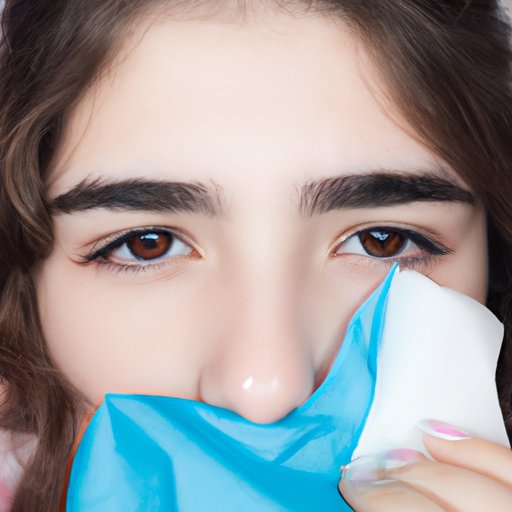Introduction
A sinus infection, or sinusitis, is an inflammation or swelling of the tissue lining the sinuses. This can be caused by a variety of things, including allergies, environmental irritants, bacterial or viral infections, or structural problems in the nose. Symptoms of a sinus infection include facial pain or pressure, nasal congestion, thick yellow or green discharge from the nose, post-nasal drip, and a reduced sense of smell or taste.
When someone has sinusitis, it’s important to know how long they are contagious for. In this article, we’ll explore the contagious period of a sinus infection and provide tips for limiting the spread of the infection. We’ll also discuss when to seek treatment and understand the duration of different types of sinus infections.
How Long is the Contagious Period of a Sinus Infection?
The contagious period of a sinus infection is typically between 10 days and four weeks, although it can vary depending on the type of infection. The most contagious period is usually during the first week of symptoms.
Exploring the Incubation Time
The incubation time for a sinus infection is the time between when a person is exposed to the virus or bacteria that causes the infection and when the symptoms begin to appear. The incubation period for a sinus infection is typically between three and seven days, but it can vary depending on the type of infection. For example, if a person has a bacterial infection, the incubation time could be shorter than if they have a viral infection.
Factors That Influence Contagious Period
Several factors can influence the contagious period of a sinus infection. Age is one factor; children tend to be more contagious than adults. People with weakened immune systems may also be more likely to spread the infection. Additionally, stress and fatigue can weaken the immune system and make it easier for the infection to spread.

Tips for Limiting the Spread of Sinus Infections
The best way to limit the spread of a sinus infection is to practice good hygiene. This includes washing your hands often with soap and water, avoiding touching your face, and covering your nose and mouth when you sneeze or cough. It’s also important to avoid contact with people who have a sinus infection.
It’s also important to disinfect surfaces that may have been exposed to the virus or bacteria. Use a household cleaner to wipe down counters, doorknobs, and other surfaces that may have been contaminated.

When to Seek Treatment for a Sinus Infection
If you experience severe symptoms of a sinus infection, such as a fever over 101°F, facial pain that doesn’t go away after a few days, or discolored nasal discharge, it’s important to seek medical attention. These are signs of a more serious infection and require treatment from a doctor.
Seeking treatment early can help reduce the risk of complications and shorten the duration of the infection. Your doctor can prescribe medications to help reduce inflammation and fight the infection.
Understanding the Duration of a Sinus Infection
The duration of a sinus infection depends on the type of infection. Viral sinus infections typically last for seven to ten days, while bacterial infections can last up to four weeks. Treatments such as antibiotics can shorten the duration of a bacterial infection.
Other factors can affect the duration of a sinus infection. Allergies, environmental irritants, and structural issues in the nose can all contribute to exacerbating the infection and extending its duration.
Conclusion
In conclusion, the contagious period of a sinus infection can range from 10 days to four weeks. The most contagious period is usually during the first week of symptoms. To limit the spread of the infection, it’s important to practice good hygiene, avoid contact with people who have a sinus infection, and disinfect surfaces that may have been exposed.
If you experience severe symptoms of a sinus infection, seek medical attention. Treatment can help reduce the risk of complications and shorten the duration of the infection. The duration of a sinus infection depends on the type of infection, but treatments such as antibiotics can help shorten it.
If you have a sinus infection, it’s important to follow your doctor’s instructions and practice good hygiene to limit the spread of the infection.
(Note: Is this article not meeting your expectations? Do you have knowledge or insights to share? Unlock new opportunities and expand your reach by joining our authors team. Click Registration to join us and share your expertise with our readers.)
